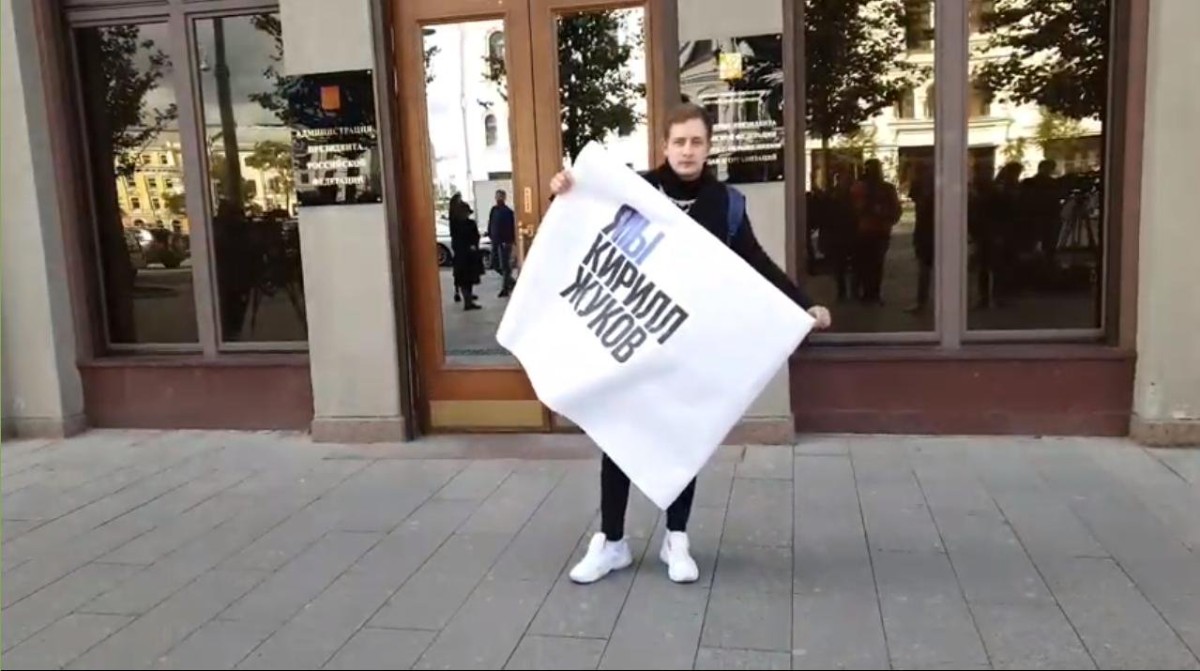 Courtesy: @ProtestSPb
Courtesy: @ProtestSPb
What the Latest “Moscow Case” Sentences Say About Justice
There were several developments in the “Moscow Case” this week. On Monday, a court upheld the two-year prison sentence of Danila Beglets for grabbing a police officer by the wrist. A review of the case left the sentence unchanged and dismissed the appeals of his lawyers. After changing his plea to not guilty, Ivan Podkopayev’s three-year sentence for pepper spraying an officer was commuted to two years on Wednesday. On the same day, Kirill Zhukov’s three-year sentence for lifting the visor of an officer’s helmet was upheld. Politics likely played a role in the weight of the sentences. Last week, a football fan also charged using Article 318 of Russia’s Criminal Code for punching a riot police officer only received a one-year sentence. The latest sentencings in the “Moscow Case” reflect the return to a business as usual approach in how the Russian judicial systems deals with dissent.
The sentencings represent a grim conclusion to weeks of “unprecedented public outcry.” Less than two weeks ago, more than 20,000 people gathered in a rally calling for the release of those detained during “Moscow’s Summer of Discontent.” The rally was a high point for Russia’s civil society. Diverse segments of society including Orthodox priests, doctors, teachers, actors, students, scribes, IT professionals, and state officials came together to voice their displeasure. In response to this public pressure, prosecutors dropped criminal charges against six of the defendants. Amid chants of “let them go,” at the rally, opposition leader Alexei Navalny attributed the decision to the Kremlin’s falling ratings and announced authorities could “see people won’t support” repressive measures against the former protesters. In the wake of the sentencings, whether this is true remains to be seen.
After dropping charges against six of the defendants, why did courts adopt harsher sentencing against others in the “Moscow Case?” What sort of rationale is governing how authorities act in these cases? Maybe there isn’t one. It is possible authorities are pursuing a policy aimed at “creating enough uncertainty” to deter would-be activists.
Or maybe these latest cases are missing something that had been present in the others. When authorities were lenient, perhaps it was because these were “obvious cases where authorities clearly misapplied the law” and attracted public scrutiny. The prominent cases of Ivan Golunov and Pavel Ustinov even seem to point to a sort of formula for securing a successful outcome. Golunov is a journalist arrested on trumped-up drug charges earlier in the summer, and Ustinov is an actor that was detained for allegedly injuring an officer. The cases followed a similar trajectory: authorities arrest someone in suspect circumstances, the victim’s colleagues unite in protest, pro-Kremlin people “join the outcry,” and the prisoner goes free.
The repeated ability of this confluence of events to secure the same outcome suggests the justice system can back down at “the prospect of a major backlash.” However, the relative importance of the factors involved remains unclear. The most recent sentencings suggest manifestations of public support like the September 29th rally aren’t enough to be decisive. People that don’t have the support of “influential lobbies,” such as professional groups, seem to receive a different sort of justice. Only “privileged creative professionals,” like journalists and actors, have managed to generate sympathy in pro-Kremlin circles. Why these pro-Kremlin figures get involved is also unclear. Are they acting of their own accord, or are they receiving direction from authorities because various components of the state “respond in different ways” and elites are “still deciding what the new rules should be?”
Even in cases of success, the ability of civil society to hold authorities accountable remains unclear. For instance, after Golunov’s release Putin personally dismissed two police generals and announced an investigation into the suspicious circumstances surrounding his arrest. Recently, however, the investigators involved have been somewhat ironically reassigned to help prosecute defendants in the “Moscow Case.” Public outcry was enough to suspend Ustinov’s sentence, but it wasn’t even to completely clear him of criminal charges.
The latest sentences provide an opportunity for Russian civil society to further sound out the contours of the Russian justice system. If civil society responds to the news by mobilizing additional demonstrations and further outcry, perhaps it can test whether it is possible for generalized public discontent to shape judicial outcomes. If, however, society largely accepts the developments, regular protesters will continue to face uncertainty when they take to the streets.





